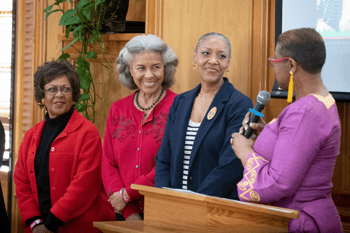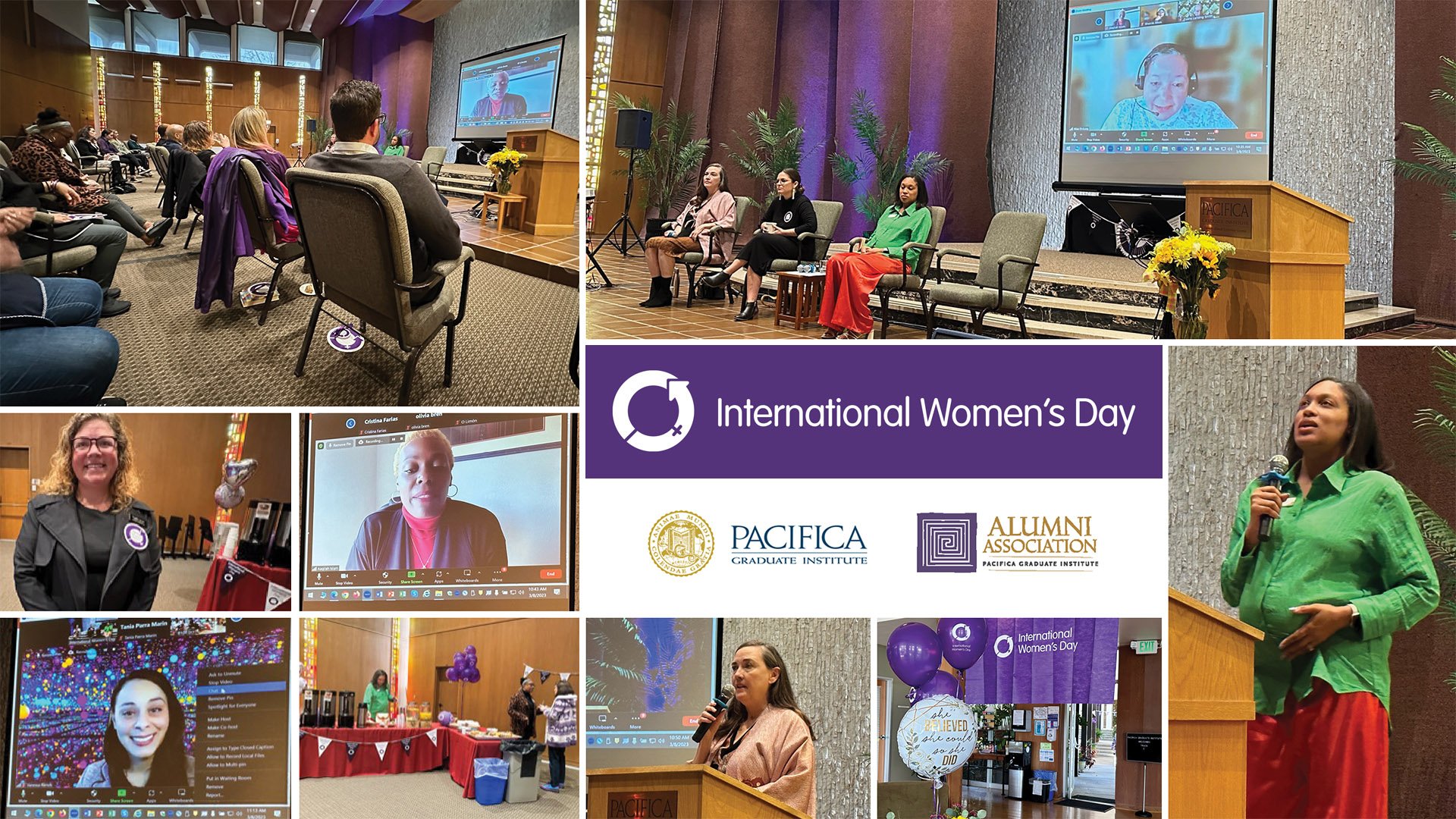
By Dr. Leonie H. Mattison, Ed.D.
Black History and Women's History Months are always an inspirational time throughout the country, as we celebrate the many ways Black Americans and women have helped shape our national story and fueled U.S. innovation. These months are opportunities to unite and honor those who fought and continue to fight for our freedom, equality, empowerment, and human rights. To recognize those who opened doors, stepped out on faith, took the elevator up, and sent it back down to bring us up. Yet, these months are at a precarious time for the Black and women communities.
When we dare to look behind the curtain of the common representations of American History and contemporary news, we find evidence of anti-Black racism and gender discrimination's deep roots. Violence, health risks and rights, and economic insecurity are some of the hardships being faced and fought in our systems and on the streets by women and Black communities. The themes of these months – "Black Resistance" (Black History Month) and "Embracing Equity" (Women's History Month) – exemplify the struggles and battles required to face these challenges.
 I mention these issues not to distract from the positivity of Black History Month and Women's History Month, but to offer a view of what we are up against as a society and as an institution. At Pacifica Graduate Institute, we prepare and equip our learners to go out into the world with a keen awareness of the unconscious dynamics that influence individual and collective behaviors and a deep respect for soul and the transformative potential of the creative. This orientation mandates an ethos of love and compassion and opens the door towards innovative models and methods capable of transforming communities, our relationship with nature, and the systems that promote inequity. I also raise these points to illustrate the burden of Blackness and womanhood —a dichotomy to be unpacked below.
I mention these issues not to distract from the positivity of Black History Month and Women's History Month, but to offer a view of what we are up against as a society and as an institution. At Pacifica Graduate Institute, we prepare and equip our learners to go out into the world with a keen awareness of the unconscious dynamics that influence individual and collective behaviors and a deep respect for soul and the transformative potential of the creative. This orientation mandates an ethos of love and compassion and opens the door towards innovative models and methods capable of transforming communities, our relationship with nature, and the systems that promote inequity. I also raise these points to illustrate the burden of Blackness and womanhood —a dichotomy to be unpacked below.
On October 3rd, 2022, when I became the first Black woman to serve as President and CEO at Pacifica Graduate Institute, I was overwhelmed with joy. The idea that I would have the opportunity to lead this storied institution with a rich history of academic excellence, innovation, and service was a dream come true. Stepping into this role, I hope my tenure here will empower Black women to follow. With this visibility comes an immense sense of pride and gratitude for being given the space to expand my community contributions and transform lives. Positively impacting lives is what Black History and Women's History are about – and contained in Pacifica Graduate Institute's mission of tending the soul of and in the world.
 But there are challenges, too. As a mother, woman of faith, and higher education leader, to be a new presence on campus requires taking time to step back, listen, and learn. In keeping with my people-first, collaborative results-oriented leadership style, I launched a 100-day listening, learning, and connecting tour to understand Pacifica's points of pride, pain, possibilities, and priorities. The goal was to provide equal opportunities for all community members to share their experiences. Listening to and assessing what our post-traditional learners and employees told me about what the ideal Pacifica looked and felt like for them, I look forward to continuing to cultivate a thriving environment where we transform and where all are seen, heard, valued, respected, cared for, and succeed.
But there are challenges, too. As a mother, woman of faith, and higher education leader, to be a new presence on campus requires taking time to step back, listen, and learn. In keeping with my people-first, collaborative results-oriented leadership style, I launched a 100-day listening, learning, and connecting tour to understand Pacifica's points of pride, pain, possibilities, and priorities. The goal was to provide equal opportunities for all community members to share their experiences. Listening to and assessing what our post-traditional learners and employees told me about what the ideal Pacifica looked and felt like for them, I look forward to continuing to cultivate a thriving environment where we transform and where all are seen, heard, valued, respected, cared for, and succeed.
Without a doubt, I am in a phase of my life that Jung refers to as Middle Life. I'm unearthing new meaning in my journey, looking inward, and finding ways to share my learnings with as many people as possible. As I follow this soulful path of individuation, I am introspective, hoping to move my focus from the physical to the spiritual, intuitive, and philosophical. Such a shift is driven by my need to find balance and become more connected to the Self. Professionally, this is a journey I can replicate for our community, as Pacifica must also engage in such work at this point in our evolution. It matters because its burden is blossoming and beauty on the other side of Blackness and womanhood. I seek to “kindle a light in the darkness of mere being” (C.G. Jung, MDR, p. 326), to move through shadow as a mirror of light that illuminates long-lasting change.
In the Jungian sense, this is the work of that mid-life journey, overcoming difficulties and fully embracing the light and the shadow of the adult psyche. Many of the Black women we honor during Black History Month and Women's History Month have done this, shaping their narratives by living their lives on their terms. They heard the clarion calls for rebirth and heeded them, pushing through the burden to experience the beauty. That is what I must do; on a greater level, it is what we all must do.
But how? Three specific strategies come to mind, which are part of my leadership ethos and can be part of anyone's work ethic if they hope to effect positive change.
First, evolution requires that we become masters of our destinies. To do so means pinpointing a destination, acquiring the necessary skills to get there, and acting with intention and clarity daily.
 Second, we must build resilience. There will be resistance to change and the perceived uncertainty that accompanies it. However, we must embrace this resistance and realize it is necessary for transformation. We build resilience by helping the resistors realize this – it is more productive to work toward than conspire against. The secret to doing this work is staying grounded in belief and focused on the North Star. In my private reflections, I consider my Great-grandmother, who was raised in a generation that believed there was no place for her in a “man’s world.” Yet, she taught me how to use the power of my imagination to transform difficult situations into positive outcomes. My Grandmother grew up in a “prove-your-worth” generation and asked how you make it in a man's world. She taught me how to use my intention to turn dreams into reality. My parents gave up everything they had in Jamaica to come to the U.S.A. to build a better life for my siblings and me. I learned the values of spirituality, happiness, and service from them. I grew up in a generation that says if they don't give you a seat at the table, bring a folding chair. I am grateful for the circuitous journey that led to my becoming the dream, hope, and answered prayer of my ancestors. I love the next generation and feel a sense of joy in supporting and witnessing them extract opportunities from the challenges they survived. These are the moment that solidifies my mission on this earth.
Second, we must build resilience. There will be resistance to change and the perceived uncertainty that accompanies it. However, we must embrace this resistance and realize it is necessary for transformation. We build resilience by helping the resistors realize this – it is more productive to work toward than conspire against. The secret to doing this work is staying grounded in belief and focused on the North Star. In my private reflections, I consider my Great-grandmother, who was raised in a generation that believed there was no place for her in a “man’s world.” Yet, she taught me how to use the power of my imagination to transform difficult situations into positive outcomes. My Grandmother grew up in a “prove-your-worth” generation and asked how you make it in a man's world. She taught me how to use my intention to turn dreams into reality. My parents gave up everything they had in Jamaica to come to the U.S.A. to build a better life for my siblings and me. I learned the values of spirituality, happiness, and service from them. I grew up in a generation that says if they don't give you a seat at the table, bring a folding chair. I am grateful for the circuitous journey that led to my becoming the dream, hope, and answered prayer of my ancestors. I love the next generation and feel a sense of joy in supporting and witnessing them extract opportunities from the challenges they survived. These are the moment that solidifies my mission on this earth.
And finally, we must lead through empowerment. Neither my success nor Pacifica's is exclusively about what happens now. Sustainable improvement will show up to the degree that others feel empowered to speak up and lead. Both Black History and Women's History offer us a rich legacy of individuals who did exactly that.
So, to those learners, faculty, staff, alumni, partners, and community members who may feel underrepresented or discounted, you must show up as who you are because your power lies in your presence. We need you.
 This moment demands we take action and shape a positive narrative for long-lasting impact. Locally, nationally, and globally, we already have many clarion calls for rebirth. We have more control over this than we know; we can change how the next chapter of our story is written and become the best version of our soul's calling.
This moment demands we take action and shape a positive narrative for long-lasting impact. Locally, nationally, and globally, we already have many clarion calls for rebirth. We have more control over this than we know; we can change how the next chapter of our story is written and become the best version of our soul's calling.
My forebearers' stories remind me that our contributions now will deliver change over time. So many Black people and women, including our alumni, faculty, and learners, are tending as gardeners of the soul in and of the world because of all we have been through. Just think of what the greats of Black and Women's history achieved before us and what they overcame while doing it. Because of all they withstood, we experience the full range of emotions and experiences we're enduring today and still cling to hope. Thus, evolution is our only option.
There's a Pacifica that exists today, but there's an even greater Pacifica we can become. We can now shoulder the burden of that metamorphosis and find beauty. We can take many lessons from Black History Month and Women's History Month. A crucial one is this: The integration of the shadow and the clarity of the vision can unearth the positive legacy that follows sorrowful struggle.
We invite you to engage in this work through our graduate degrees, certificate programs, and community engagement activities. www.pacifica.edu


Dr. Leonie H. Mattison, Ed.D, the fourth President, and Chief Executive Officer of Pacifica Graduate Institute, ushers in a new chapter as the first black female to assume leadership of the 45-year-old institution, with her term beginning in October 2022.
Dr. Mattison brought her extensive experience as a transformational, people-first philosophy to increase the impact of Pacifica. She will ensure Pacifica becomes a world-class institution that improves lives and communities through collaboration among students, alums, faculty, and staff. This starts with listening to the Pacifica community to ensure she can provide the highest-quality education to students and equip them with the tools to better the world. Since taking office, President Mattison has focused on engaging diverse voices on and off campus in conversation about Pacifica’s past, present, and future.
Born in Jamaica, West Indies, Dr. Mattison grew up learning from her mother, who taught her how to interpret dreams, and her grandmother, who taught her the power of turning imagination into reality through quilting. Moving to New York City in her teen years, she witnessed the potency of education to elevate people out of poverty and change lives, including her own. She earned a Master’s in Business from Georgian Court University and a Doctorate of Education in Organizational Leadership from Argosy University. Prior to Pacifica, she served as Chief Operating Officer of a community agency that provides education and support services for vulnerable Santa Barbara residents. Other leadership positions include adjunct professor and lecturer at Antioch University and Santa Barbara City College School of Extended Learning and Chief of Organizational and Talent Development at the County of Santa Barbara, where she was instrumental in developing the Employees University, an open-source university created through a partnership between the county and Santa Barbara City College that has provided high-quality training and cutting-edge leadership development for over 4,700 county employees.
She is the proud mother to her three daughters and a grandmother to one granddaughter. In 2018 she was recognized by the Pacific Coast Business Times as a 40 Under 40 recipient 2018 and an emerging Black leader in 2021. An author, Dr. Mattison, recently published her book, The Thread: Six Steps to Intentional Transformation After Trauma or Crisis, which was recently recognized by the Santa Barbara Independent.



